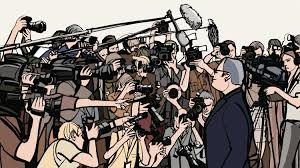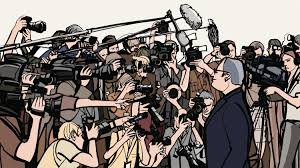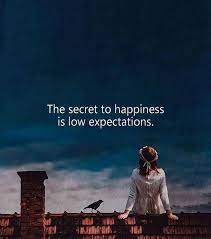Gowhar Geelani
 Internationally acclaimed organisation Reporters Without Borders (RWB) recently released its 2016 World Press Freedom Index (WPFI), which again highlighted the fact that journalists across the globe are vulnerable to physical attacks, murders, injuries, kidnapping, intimidation and various kinds of pulls and pressures from both state as well as non-state actors.
Internationally acclaimed organisation Reporters Without Borders (RWB) recently released its 2016 World Press Freedom Index (WPFI), which again highlighted the fact that journalists across the globe are vulnerable to physical attacks, murders, injuries, kidnapping, intimidation and various kinds of pulls and pressures from both state as well as non-state actors.
Understandably, the situation for journalists discharging their professional duties in conflict zones such as Syria, Ukraine and Kashmir continues to be depressing as they face wrath from various actors and the vested interests.
Journalists working in restive regions often find themselves caught between a rock and a hard place.
Meanwhile, in a disturbing disclosure, Pakistan is ranked 147 out of 180 countries while the ‘world’s largest democracy’ ranks 133. Large sections of Indian media often describe Pakistan as a ‘failed state’ and claim that India is a ‘thriving democracy’.
Essentially, it implies that in relation to the freedom of press and working conditions for journalists there is not much difference between the ‘world’s largest democracy’ and a supposedly ‘failed state’. Meanwhile, in China, they say, that the problem with India is that she believes in its own propaganda.
Published by RWB annually since 2002, the WPFI “measures the level of freedom available to journalists in 180 countries using the following criteria – pluralism, media independence, media environment and self-censorship, legislative environment, transparency, infrastructure, and abuses.”
The report presents a dismal picture. It shows that there has been a “deep and disturbing decline in respect for media freedom at both the global and regional levels.”
According to RWB the global indicator has gone from 3719 points last year to 3857 points this year, a 3.71 percent deterioration. The decline since 2013 is 13.6 percent.
The report voices concern over this decline in freedom or press which it says has further deteriorated in places like Turkey and Egypt, partly because of “tighter government control of state-owned media” and “authoritarian tendencies of governments”.
Conditions with regards to press freedom and freedom of information in eastern European countries like Poland are also not encouraging either.
The report also says that “some governments do not hesitate to suspend access to the Internet or even to destroy the premises, broadcast equipment or printing presses of media outlets they dislike”. Besides, it also says that many laws have been adopted penalizing journalists on spurious charges which include “insulting the president,” “blasphemy” or “supporting terrorism.” It describes growing self-censorship as alarming situation.
This brings us back to Kashmir Valley where the state governments often impose e-curfew under the garb of maintaining law and order. Moreover, the government advertisements are stopped to various newspapers the authorities loathe for its content or their courage to speak to powers that be in a responsible manner.
Kashmir is a classic case of self-censorship as well. Factors like state control, unprecedented surveillance and fear of losing government advertisements force many a Srinagar-based newspaper crawl and suppress particular news and content to ensure survival. At times, the news regarding alleged malpractices by capitalist ventures and food adulteration by private brands is suppressed with an aim to keep the newspaper’s economic health in stable condition.
Newspapers in Kashmir have a lot of stakes because there is over-reliance on government advertisements. In absence of a culture of paid online subscription, all media organisations heavily depend on government and private advertisements, making life difficult for most newspapers.
Successive governments in Jammu and Kashmir have curtailed the number of advertisements they give to some newspapers for their alleged “separatist content”. After the 2010 wave of anti-India street protests in Kashmir, the Indian Home Ministry issued an advisory to cut back or place a blanket ban on government advertisements to the Jammu-based English daily Kashmir Times, the Srinagar-based Rising Kashmir and leading English daily published from Srinagar. All government advertisements were stopped to Rising Kashmir between 2010 and 2012.
To be a journalist in Kashmir is to be victim to violence, suspicion, distrust, accused of taking sides and having a jaundiced view. Journalists are forced to weigh the ramifications of every word they say on air or write in print.
As the popular armed revolt began in the Kashmir Valley in 1989, many scribes started becoming soft targets for the government forces, government-sponsored counter-insurgents (renegades/Ikhwanis) and also the gun-wielding youth fighting for Kashmir’s ‘azadi’.
Journalists have been killed, kidnapped, intimidated, physically targeted, or coerced into toeing a particular line. They have often been ducks for both the government forces and militants. Each side would accuse them of taking sides. Questions were asked about their credibility, integrity and impartiality.
Some journalists say that there have been positive changes on the ground if one compares the present situation to the early nineties. They say that journalists today have better tools like the Right to Information Act (RTI) to access information and the access to spot of action has also improved.
However, there are others who say that the politics of controlling the media in Kashmir has continued unabated and it has manifested itself in various forms. They say that there are vested interests, playing the role of gatekeepers behind the curtains.
In the early nineties, for instance, the focus was on enforced custodial disappearances, human rights abuses by the army and paramilitary. Even the Oped pages would talk about the resolution of the Kashmir issue, but that has significantly changed since. As the militancy weakened, regular front page stories about disappearances, torture and extra-judicial killings started shifting to the inner pages.
Journalists are the unsung heroes. They have tried their best to act as watchdogs of Kashmir society. They have faced the wrath from all possible stakeholders. They have paid a heavy price for calling a spade a spade and speaking to powers that be.
Yes, they have also made some mistakes and tried to learn from these. They have faltered and stumbled, too. Notwithstanding all such challenges and pressures from all sides, most journalists in Kashmir have discharged their professional duties and maintained impartiality and objectivity in extreme trying conditions.
hum parvarish e loh o qalam karte rahenge / jo dil pe guzartee hai raqam karte rahenge
P.S: Sometimes it is not too bad to write about one’s own profession.





